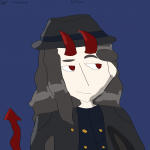Rangers
Rangers are for lack of a better term, mercenaries and bounty hunters that take on jobs related to defense, scouting, and even rescue in exchange for monetary compensation. Rangers and Ranger teams act autonomously, picking and choosing jobs wherever and whenever they see fit.
But first, Rangers have to be successfully tested and registered to even start work at all. New Rangers are tested and registered by a representative from the G.R.A. that works at one of the many Exam Sites, who then enters them into the database and grants them their Ranger Badge. Once they are accredited, they will receive a unique Emblem that goes on the front of their badge, signifying their class. Rangers must display their badge and class at all times for accountability reasons. They aren't required to display their rank.
However, Rangers don't participate in formal conflicts between different countries, because it goes against their "Code". This "Code" was adopted by all who wish to call themselves Rangers once the Global Ranger Association (G.R.A.) decided upon it.
The G.R.A. is run by a council of Admins. These Admins oversee all Ranger and Stationmaster and Guildmaster activity in a specific region.
There are 3 types of Rangers; Guild, Rogue, and Independent.
Guild Rangers belong to a specific Guild, and are restricted to operating only within that Guild's Realm. For instance, a Ranger that belongs to a Guild in Fortuna can only operate within Fortuna. However, there are some occasions when Guild Rangers will be given special permission to take on a job outside of their normal area of operation. All new Rangers (Bronze Rank) must work for a Guild until they reach Silver Class. This is because the GRA wants to keep an eye on all new Rangers, both for their and society's benefit. Once they reach Silver Class, they can either stay with the Guilds or become Independent.
Rogue Rangers belong to a "Rogue Guild", which isn't officially recognized by the GRA, and as such is branded a criminal organization. They are akin to shadowy organizations. They are much less bureaucratic and have much lower standards, but the profits are much higher. This is because they lack just about any oversight on the nature of the jobs they offer, as well as who they come from. Instead of going to the Ranger Station, the reward goes straight to the Ranger or Ranger Team, who then give a cut to the Guildmaster. Rogue Rangers obviously don't like to call attention to themselves or their actions, so they make an effort to appear like normal Rangers.
Independent Rangers are Rangers that do not belong to any Guild and must take on appropriately-classed jobs from job boards at various Ranger Stations in order to get by. Only Silver Class Rangers and above are able to operate as Independent Rangers.
All Rangers, Guild, Rogue, and Independent are all able to make use of Ranger Stations, smaller outposts and offices that are the source of all jobs that Rangers are able to take on. They all compete for the same jobs, and depending on their type, they will be able to take more on from their work. (Independents make less, while Guild members make more). In order to accept a job, the Ranger must choose one of appropriate rank and use their Badge to confirm it.
Ranger Teams
Each team name is unique, as it becomes a recognizable brand of sorts when advertising their services.
However, competition is fierce in this field, and even though they are free to travel and take jobs from anywhere they want, rival companies, teams, and Guilds will often get into territorial disputes or skirmishes. The G.R.A. highly discourages this behavior, but it can only do so much to stop it entirely. If fights break out, then the authorities of the region have permission to take action against the Rangers responsible for it, and the G.R.A. can do little about it.
Sometimes, jobs may require 2 or more Ranger teams to complete, and some may even require a large squad of teams to complete.
If a Ranger operates alone, they are considered an "Independent Ranger".
If there are two or more Rangers acting together, they are considered a "Ranger Team".
Ranger Teams can break off into sub-groups, with different combinations of members taking on different missions while contributing to the team as a whole.
Ranger Class and Rank
Ranger Class refers to an individual Ranger's level of experience at being a Ranger. This also determines which class of job they are allowed to take on. For instance, a Bronze-Class Ranger cannot take on a Silver-Class job unless they have one Silver-Class Ranger accompanying them, and so on. Each successful job that a Ranger completes will help raise them to the next Class. Rangers don't have to be the same Class to be in a Team together. They are standard for all Independent Rangers and Teams:
Bronze
Silver
Gold
Platinum
Ranger Rank refers to an individual Ranger's and Team's standing in regards to all other Rangers and Teams. Rank is a bit more complicated to calculate. All Rangers and Teams start at the very bottom when they're new. Not only does a Ranger's Class increase when they have successful jobs, but their Rank will as well. Every single Ranger has two Ranks. However, the one that is acknowledged at any given time depends on what type of Ranger they are. If they are Independent, then they are listed according to the Independent Rankings, and the same is true for the other cases. However, that doesn't mean that one's Rank will remain the same if they switch between modes. Both of a Ranger's Ranks will fluctuate accordingly, meaning that if an Independent Ranger that is Rank 34 in the world joins a Team, then there is no guarantee that they will remain at Rank 34 for Independent Rangers. Their peers could continue being Independent and will be climbing the Ranks while he/she inevitably falls behind. If that Ranger were to return to being an Independent Ranger a year later, they might find that they have fallen a good few Ranks. It is also important to note that if a Ranger isn't currently a member of a Team, then their Rank for those modes will be nonexistent. Rangers adopt the Rank of whatever Team they join. So, if an Independent Rank 56 Ranger joins a Rank 13 Team, then they will be collectively referred to as a Rank 13 Team, and their individual Rank will not be viable and will lay dormant unless they become an Independent Ranger again.
Ranger Stations
Ranger Stations are basically neutral bases and safehouses for any certified Ranger that wishes to make use of their facilities. They were initially independently set up by the G.R.A., and serve as hubs of activity for Rangers, and a link between them and the populations they serve. All jobs for Rangers submitted from the community are posted only at these stations on moderated job boards, and the Rangers must collect their reward for a successful job from the staff at the station. Stations turn a profit and pay for their beneficial features by taking a portion of earnings from each successful job completed by the Rangers that use their services. There is also a chance that the G.R.A. will feel that it is necessary to mobilize all Rangers in a specific area in response to a large threat or special event like a tournament. If this occurs, then the Rangers called will meet at the nearest Ranger Station for briefing and further details.
The services offered by Ranger Stations include recruitment, certification, job boards, reward collection, temporary lodging, food, and acting as meeting places.
There are also listings of locally-active criminals on job boards, which are able to be scanned by Ranger Badges so they can keep the information on hand. These jobs are separate from client-given jobs, and are supervised by the authorities in each Station's jurisdiction.
Those who run the Ranger Stations are called Stationmasters.
Legal Guilds
Legal Guilds are Ranger Guilds that are officially sanctioned and recognized by the Global Ranger Association (GRA). They are also officially recognized by the Realms that they operate out of. This recognition comes in handy for them, as it increases their reputation among potential clients. This is because clients generally prefer vetted and reliable Rangers to Independent Rangers.
If accepted to a Guild, Rangers will be able to access many different benefits, such as; access to lodging and amenities as long as they remain a member, a lower rate of fees paid to the GRA, access to the Guild Ranking System, exclusive access to Ranked Jobs, and access to the Guild grounds. Any Ranger can also only have one Guild Membership at any given time. If they desire to join another Guild, they must first formally leave their original Guild before trying out for the next one.
One big perk of belonging to a Guild is having a Guild Rank as well as access to Ranked Jobs, which are gated off depending on the rank of a Ranger. For instance, a B-Rank Ranger in a certain Guild cannot take on an A-Rank job without special permission. Otherwise, they will have to be promoted. However, Independent Rangers cannot take on any Ranked jobs at all, and must stick with Unranked Jobs.
It is also not uncommon for Legal Guilds to collaborate with one another on projects. There are also a lot of instances of inter-Guild collaboration between Teams of Rangers to promote friendly competition and cooperation.
Legal Guilds also have exclusive rights to participate in the Guild Games.
Heirarchy in the Legal Guild System
• The Ranger Heirarchy goes; Chairman, Administrator (Council), Guildmaster (Council), Guild Captain, Team Leader, and Individual Rangers.
The Chairman is the person in charge of all Administrators throughout the world.
The Administrators preside over certain regions of the world. They all serve on a council below the Chairman. Administrators are hand-picked by the Chairman. (For example; Horus the Slowking is the Admin of the Far Realms.)
Likewise, the Guildmasters of all Legal Guilds are on a council of their own that answer to the Administrator of the region.
Then, the Guild Captains serve the Guildmaster, and hold sway over Team Leaders. They do not have any councils of their own.
Team Leaders are only in charge of their own teams. They do not have any councils of their own.
Rogue Guilds
Rogue Guilds are more akin to shadowy organizations and gangs rather than respected organizations. They operate unofficially, and aren't ordained by the GRA, making them illegal organizations. In essence, they act as both Guilds and Ranger Stations in one.
Through the hacking of the Nexus System, they have complete access to all Ranked and Unranked jobs in any given region.
One defining difference between Legal and Rogue Guilds is that Rogue Guilds lack much of the oversight and regulation that Legal Guilds have. Legal Guilds are very much concerned about their reputation and operating within the confines of the law, while Rogue Guilds are mainly only concerned about profit and power. A Legal Guild will certainly expel someone if they commit an unjust murder, but Rogue Guilds will look the other way. In addition to less rules, they also have lower standards regarding who can join. All it takes is an oath of loyalty and confirmation that they completed the initial test to become a Ranger as well as the required training program, and they're very likely to get accepted. This is because Rogue Guilds are dangerous, and often allow less-experienced Rangers take on jobs not suited for them, leading to a high mortality rate. This means that only the toughest Rangers can survive in a Rogue Guild.
If it is discovered that a Ranger is participating in a Rogue Guild, they will most likely be banned from entering any Legal Guilds, and they will be put on trial before the GRA. They may even lose their Ranger Badge entirely. For this reason, Rogue Guilds and their members are very secretive.
One of the aims of the Rogue Guilds is to counter the bureaucracy and high standards of the Legal Guilds and the GRA in general by giving those that the Guilds shunned for one reason or another a fighting chance to make it as a Ranger. In this way, they see themselves as champions of the average Ranger, while the Guilds are elitist in comparison. They say that they don't believe in the GRA's ways of restricting work through labels, titles, and ranks, and they want everyone to have a fair shot. In fact, there are many average citizens that see the Rogue Guilds as a good thing, whether its because they agree that everyone should have a fair shot, because they will still get the job done for the right price, etc. However, their critics come back and say that they leech off of the GRA's underbelly by swiping jobs meant for those who worked hard enough to earn them, using their badges to benefit themselves while spitting in the face of the GRA, etc.
The Guildmasters of Rogue Guilds don't serve on any council, and usually refrain from working with other Rogue Guilds.
As anticipated, there is a lot of conflict between the Legal and Rogue Guilds, with the Rogue Guilds trying to undermine the Legal Guild system while the Legal Guilds attempt to crush the Rogue Guilds, but not so much between them and Independent Rangers, who prefer to focus on advancing their careers and staying clear of Ranger politics.









